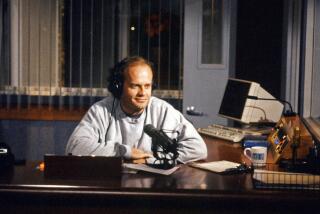The Cutting Edge: COMPUTERS / TECHNOLOGY / INNOVATION : A Regular Roamin’ Empire for Film Buffs
- Share via
The question was about “Champagne for Caesar.” A friend was urging me to see “Quiz Show,” which brought to mind a much earlier movie I’d stumbled across, a quiz-show comedy called “Champagne for Caesar.” But it had been about 25 years ago, on late-night television, and the movie had seemed ancient even then.
Needing to know more, I eschewed the easy path--pulling a book down from the shelf, asking a knowledgeable friend, or waiting for the whole impulse to pass--and plunged into cyberspace. I am happy to report that I now know almost everything about “Champagne for Caesar,” including who played the parrot. All this information was gleaned from on-line sources, and none of it required any great technical skill (a good thing, because I don’t have any).
Indeed, there is no shortage of movie- and TV-oriented materials in cyberspace. They range from the nakedly promotional--especially some of what is found on the Big Three on-line services--to the quintessentially academic, as in a paper I tripped over on the World Wide Web called “The Political Aesthetic: Nation and Narrativity on the ‘Starship Enterprise.’ ” Ah, the thrill of intellectual inquiry.
But back to “Champagne for Caesar.” For patient users whose only access to cyberspace is via e-mail, the best way to find out about movies is to use the Movie DataBase Server maintained by England’s PC User Group.
For instance, I sent e-mail to movie@ibmpcug.co.uk with the following command in the body of the message: MOVIE Champagne for Caesar
You can also use the database to learn about actors, directors and so forth. The best way to get started is to send for help first. Just e-mail the above address with the word HELP in the subject field.
Anyway, I learned this way that “Champagne for Caesar” was made in 1950 by United Artists. I also got all the credits, including who wrote the music and which actors had which roles.
Next stop: the World Wide Web, which carries tons of movie resources. The best way to get started here is to visit the famous Yahoo list at https://www.yahoo.com. Pick the Entertainment topic and you’ll be faced with many choices. I decided to hit the Cardiff Movie Database Browser at https://www. msstate.edu. It’s full of good information, and you can even search by keyword. Using the Cardiff database, I could easily see what else Richard Whorf, the director of “Champagne for Caesar,” had done. (With credits including “Blonde Fever,” it appears Whorf isn’t going to make anyone forget Preston Sturges.)
But I wanted to know more, so I headed next for CompuServe, which offers an enormous amount of movie- and entertainment-oriented material; just GO MOVIES. Basic services includes the All-Movie Guide, a searchable database of more than 50,000 films. The plot summaries are pretty lame, but you get lots of other information about pictures here, including the domestic box office gross. You can even search by genre.
CompuServe also offers gossip columns, discussion forums, Associated Press entertainment news, and prime-time TV schedules going back for decades (in 1956, when I was born, Sunday was a big night: Jack Benny, Loretta Young, Steve Allen, Alfred Hitchcock and Lassie all had shows).
In addition, there are soap opera summaries, lots of gigantic full-motion video clips from movies (these take forever to download), and more. Perhaps best of all is Magill’s Survey of Cinema, a great resource that includes hugely detailed plot summaries, historical context and other information for thousands of films. Magill’s is $2 per search plus $2 for the full text about a movie, so getting the lowdown on “Champagne for Caesar” cost me $4.
Not bad, but I could have saved the money by visiting Prodigy first. Its movie offerings don’t approach those of CompuServe, but it does offer Magill’s as part of its regular service instead of charging extra. Prodigy also offers figures on box office grosses from the Hollywood Reporter trade paper, as well as a movie bulletin board for discussions.
Anyway, according to Magill’s, “Champagne for Caesar” was ahead of its time. It predated not just all the brouhaha over fixed game shows, but even the advent of nationwide television broadcasts. And as a social critique, it really was prescient.
By now I had an awful lot of information about this picture, but for the sake of completeness, I continued nosing around. America Online, I found, offers a good many film reviews, and even has a place for aspiring actors to upload pictures and resumes, although I have my doubts about whether this is really the best way to reach Steven Spielberg. AOL also offers entertainment news stories from the trade paper Variety, and there are a good many film clips, photos of stars, etc. available for download.
As for “Champagne for Caesar,” it’s the delicious story of Beauregard Bottomley (Ronald Colman), a feckless intellectual whose encyclopedic knowledge stops just short of how to make a buck. Rejected for a job by a soap company, Bottomley exacts vengeance by going on its idiotic quiz show and winning again and again until the firm’s entire net worth is at stake. Art Linkletter is the conniving game show host and Vincent Price is the unscrupulous president of the soap company, who hires Celeste Holm to distract Bottomley and find a chink in his intellectual armor.
Mel Blanc, the voice of Caesar, makes the inspired casting complete. Caesar is Bottomley’s parrot.
*
Tom Mandel, a subject of last week’s Postcard from Cyberspace column, died of lung cancer last week.
(BEGIN TEXT OF INFOBOX / INFOGRAPHIC)
Tinseltown@Hollywood.com
Hollywood types who don’t have a lot of time for all the volume and static associated with Internet mailing lists still might want to consider Electronic Hollywood, a nifty informational mailing that reports in detail on films in production.
Maintained by Johnnie J. Young of Studio City on the LA FreeNet, the list is free--at least for now--and you can easily subscribe. But don’t be surprised when you receive text files that can run as large as 175K. Just send e-mail to ag117@lafn.org saying: SUBSCRIBE HOLLY WOOD capra@columbia.com Frank Capra. Of course, if you’re not Frank Capra, fill in your own e-mail address and name.
Public Domain Electronic Digest is the e-mail version of a newsletter that covers literary works, music and other material whose copyright is expiring. The biweekly electronic version isn’t as extensive as the paper one, but then again, it’s free. To subscribe, send e-mail with subject line subscribe PDEP to nrugglespanix.com on the Internet, or 76266,3447 on Compuserve, or Nruggles on America Online. The message body should include name, address, phone, fax and line of work.
* Daniel Akst, a Los Angeles writer, is a former assistant business editor for technology at The Times. He welcomes messages at akstd@news.latimes.com but regrets that he cannot reply to every one.






